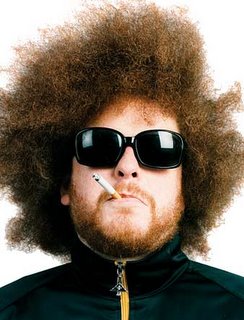John Updike, the Pulitzer Prize-winning novelist, prolific man of letters and erudite chronicler of sex, divorce and other adventures in the postwar prime of the American empire, died Tuesday at age 76. Updike, best known for his four "Rabbit" novels, died of lung cancer at a hospice near his home in Beverly Farms, Mass., according to his longtime publisher, Alfred A. Knopf.
I was a fan long ago and I greatly admired his skill with words but his seeming inability to pull back from his explicit sex scenes finally drove me away. Yeah, I'm a prude. So?
Still, there's plenty of Updike's work to enjoy, and his essays are quite good. A few years back, he'd gotten into a literary dust up with Tom Wolfe but I remember thinking Updike's position lacked merit though I don't remember why. The lengthy of his career and prolific output should have earned Updike the Nobel Prize and while we all know it's more about politics than it is literary merit that gets you the prize, I believe Updike's politics should have been liberal enough to get him in. Who knows why he never snagged the Nobel.
Updike's death diminishes American literature.
That's not much from me, so let's go to National Review Online. Here's Rick Brookhiser:
I wrote about John Updike in The Way of the WASP. I went through a phase of reading him wall-to-wall. It cooled off, but I still go back to his comedies of damnation (Roger's Version and The Witches of Eastwick), and his book about his Jewish alter ego, Bech: A Book. (Don't think there is such a thing as a hilarious bibliography? Bech: A Book has one). His first book on Harry Angstrom, Rabbit, Run, is also fine, and there are good things in the Rabbit series, though it runs thin as it goes. His African fantasia, The Coup, is also definitely worth it. His short story "Pigeon Feathers" is endlessly anthologized, deservedly so; some of the stories in Too Far to Go are also good.
But even in the failures there are good things. The Centaur is an early novel, crippled by a phony mythological structure; but the evocation of small-city Pennsylvania (Reading, I believe) is wonderful.
Fashion is cruel and time sorts, but I believe he has left us valuable things. R.I.P.
And here's Thomas Mallon:
Perhaps the keenest compliment one can pay him as a man is to say that his life will make for a lousy biography: Just about no scandal; precious little feuding; almost no phony contretemps and posturing. He was deeply interested in sex and God, but more than anything he was interested in working—steadily and prodigiously. The Rabbit books, taken together, are the great American novel of the second half of the twentieth century. Even when he was through with them, he kept writing fiction as if, culturally, it still counted—as if it could still land a writer on the cover of Time. He loved his country, avoided political faddishness, was a devoted Democrat and got both of his national medals—one in the arts and another in the humanities—from Republican presidents. On a personal level, I'm forever grateful to him. Fifteen years ago he took a shine to one of my novels and wrote several pages about my work in The New Yorker; I had a different career the next day, thanks to him.




No comments:
Post a Comment